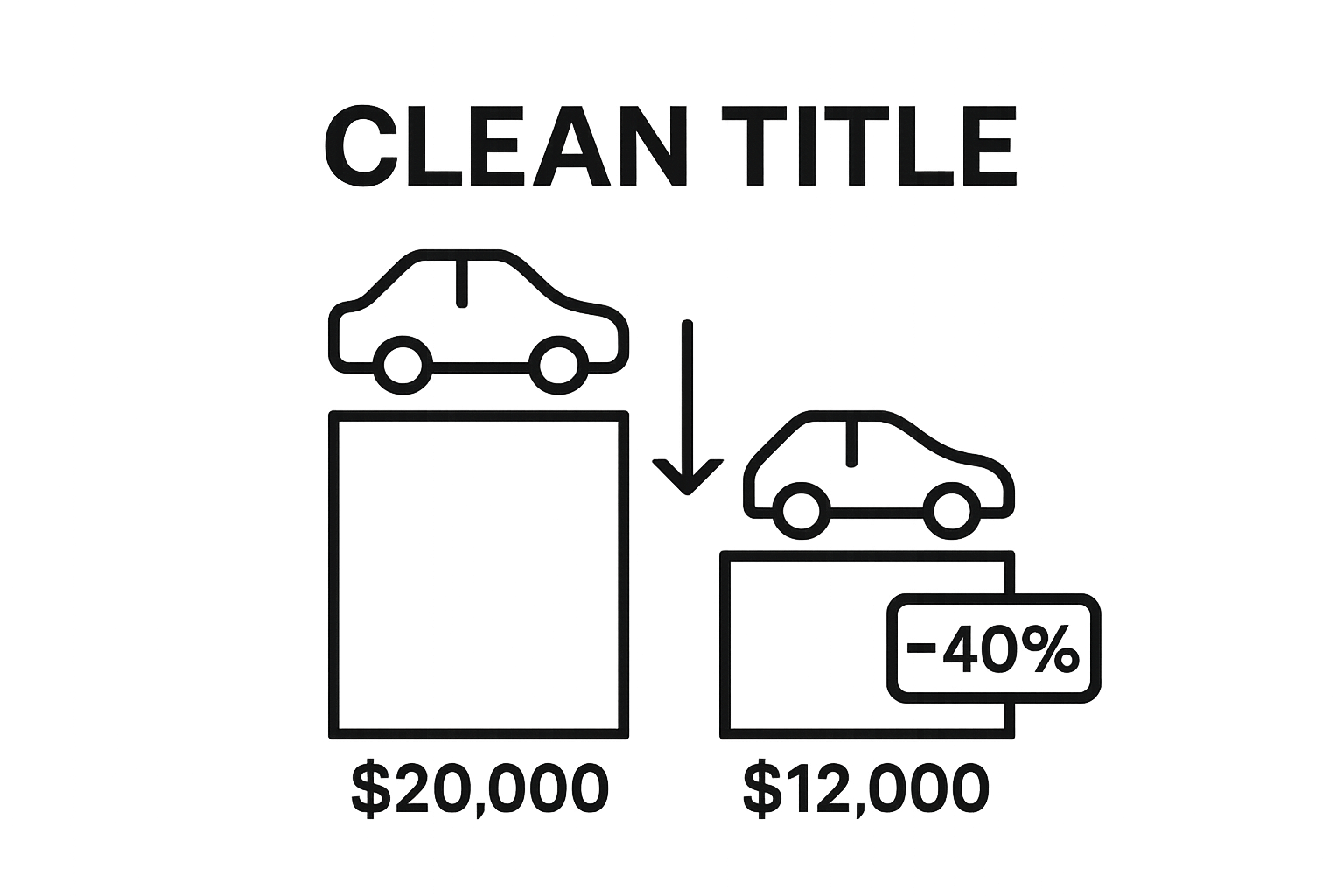Understanding Rebuilt Title Car Value: What You Need to Know
September 19, 2025
A car with a rebuilt title often sells for 40 to 50 percent less than the same model with a clean title. Most people see that steep discount and assume something is seriously wrong. Guess what. That lower price does not always mean you are stuck with endless headaches. Sometimes it opens the door to huge savings on a well-restored ride.
Table of Contents
- What Is A Rebuilt Title And Why Does It Exist?
- How Rebuilt Title Cars Are Valued In The Market
- The Importance Of Rebuilt Title Car Value For Buyers
- Key Considerations When Buying A Rebuilt Title Vehicle
Quick Summary
| Takeaway | Explanation |
|---|---|
| Rebuilt titles indicate repaired vehicles | A rebuilt title signifies a vehicle has been restored to meet roadworthy standards despite prior significant damage. |
| Cost savings of 40-50% compared to clean titles | Rebuilt title vehicles are generally priced 40-50% lower than their clean title counterparts, offering substantial savings. |
| Conduct thorough inspections before purchase | Always perform detailed inspections and review repair documentation to mitigate potential risks associated with rebuilt title vehicles. |
| Consider long-term maintenance costs | Be aware that rebuilt title vehicles may incur higher maintenance costs over time due to their complicated repair histories. |
| Insurance and financing may be limited | Many lenders and insurers view rebuilt titles as higher risk, leading to potential limitations in coverage and financing options. |
What is a Rebuilt Title and Why Does It Exist?
A rebuilt title represents a vehicle that has experienced significant damage but has been professionally repaired and restored to meet roadworthy standards. Unlike popular misconceptions, a rebuilt title doesn’t automatically signal an unreliable vehicle. Instead, it indicates a car that has been given a second chance at life after experiencing substantial damage.
The Journey from Damaged to Roadworthy
When an insurance company determines a vehicle has sustained damage exceeding approximately 75% of its market value, they typically declare it a total loss. This process doesn’t mean the car is permanently unusable.
This table summarizes the core steps involved when a damaged car transitions to a roadworthy vehicle with a rebuilt title.
| Step | Description |
|---|---|
| Insurance Declares Total Loss | Vehicle is deemed a total loss after major damage |
| Damage Assessment | Professional evaluates the extent of damage |
| Repairs & Parts Replacement | Damaged components are repaired or replaced |
| Safety & Structural Inspections | Thorough inspection ensures repaired integrity |
| State Certification | Vehicle passes required state roadworthiness tests |
| Title Issued as Rebuilt | Authorities grant a rebuilt title after approval |
The rebuilding process involves several critical steps:
- Professional assessment of damage extent
- Detailed repair and replacement of damaged components
- Thorough safety and structural inspections
- State-mandated certification to ensure roadworthiness
Why Rebuilt Titles Exist
Rebuilt titles exist as a practical solution in the automotive ecosystem. According to the Texas Department of Motor Vehicles, these vehicles provide an opportunity to salvage cars that would otherwise be scrapped, offering several benefits:
- Cost Efficiency: Rebuilt titles can be significantly more affordable than comparable clean title vehicles
- Environmental Sustainability: Repairing vehicles reduces automotive waste
- Opportunity for Quality Vehicles: Many rebuilt title cars represent excellent value after professional restoration
The existence of rebuilt titles reflects a pragmatic approach to vehicle lifecycle management. They represent not just a bureaucratic classification, but a testament to automotive engineering and the potential for renewal. While potential buyers should always conduct thorough inspections, rebuilt titles offer a legitimate pathway to owning a reliable vehicle at a reduced cost.
The following table breaks down and compares the key differences between clean title and rebuilt title vehicles, helping readers quickly understand their major distinctions.
| Feature | Clean Title Vehicle | Rebuilt Title Vehicle |
|---|---|---|
| Title Status | Never totaled; no major damage | Previously totaled; professionally restored |
| Market Value | Full market value | 40-50% less than clean title counterpart |
| Insurance Availability | Widely available, standard rates | Limited options, higher or restricted rates |
| Financing Options | Readily available | Often restricted or unavailable |
| Required Inspections | Standard pre-sale checks | Mandatory structural & safety inspections |
| Future Resale Value | Retains standard depreciation | Significantly lower resale value |
| Maintenance Risks | Predictable, based on age/mileage | Potential for higher, unpredictable costs |
How Rebuilt Title Cars Are Valued in the Market
Valuing rebuilt title cars involves a nuanced approach that differs significantly from traditional vehicle valuation methods. Unlike clean title vehicles, rebuilt titles require a more comprehensive assessment that considers multiple factors beyond standard market pricing.
Key Factors Influencing Rebuilt Title Vehicle Value
The market value of a rebuilt title car depends on several critical elements. What are Rebuilt Titles Worth? provides deeper insights into this complex valuation process. Potential buyers and sellers must consider:
- Quality and extent of repairs performed
- Detailed vehicle history documentation
- Age and original market value of the vehicle
- Current condition and mechanical performance
- Specific damage type and repair complexity
Pricing Mechanism for Rebuilt Titles
Typically, rebuilt title vehicles are priced approximately 40-50% lower than comparable clean title vehicles. According to the National Highway Traffic Safety Administration, this significant discount reflects the vehicle’s complicated history and potential future maintenance requirements.

Key valuation considerations include:
- Inspection Documentation: Comprehensive repair records increase potential value
- Original Vehicle Condition: Pre-damage vehicle specifications impact pricing
- Repair Quality: Professional, thorough repairs can minimize value depreciation
Understanding rebuilt title valuation requires recognizing that these vehicles represent more than just damaged goods. They are carefully restored transportation options that offer significant financial advantages for informed buyers willing to conduct thorough due diligence.
The Importance of Rebuilt Title Car Value for Buyers
Rebuilt title vehicles represent a unique opportunity for budget-conscious buyers seeking reliable transportation at significantly reduced prices. Understanding their market value requires a strategic approach that balances potential savings with comprehensive risk assessment.
Financial Advantages of Rebuilt Title Vehicles
The primary attraction of rebuilt title cars lies in their substantial cost savings. The Benefits of Buying Rebuilt Title Vehicles highlights how these vehicles can offer considerable financial advantages. Typically, rebuilt title cars are priced 40-50% lower than comparable clean title vehicles, making them an attractive option for buyers with limited budgets.
Key financial benefits include:
- Significant upfront purchase price reduction
- Lower insurance premiums
- Potential access to higher-end vehicle models at more affordable prices
- Reduced depreciation compared to new vehicles
Comprehensive Value Assessment
According to the Texas Department of Motor Vehicles, evaluating a rebuilt title car’s value extends far beyond its price tag. Buyers must conduct thorough assessments that include:
- Repair Quality: Detailed inspection of restoration work
- Vehicle History: Comprehensive documentation of previous damage
- Current Condition: Mechanical performance and structural integrity
- Long-Term Reliability: Potential future maintenance requirements
While rebuilt title vehicles offer significant value, they demand a more nuanced approach to purchasing. Successful buyers recognize that value isn’t just about the lowest price, but about finding a reliable vehicle that meets their specific transportation needs while minimizing potential risks.
Key Considerations When Buying a Rebuilt Title Vehicle
Buying a rebuilt title vehicle requires a strategic approach that balances potential savings with comprehensive risk management. Buyers must navigate a complex landscape of mechanical, financial, and legal considerations to make an informed decision.
Professional Inspection and Documentation
Are Rebuilt Titles Bad? suggests that thorough investigation can mitigate most potential risks. A professional pre-purchase inspection is crucial, involving:
- Comprehensive mechanical assessment
- Detailed structural integrity evaluation
- Complete review of repair documentation
- Verification of state-mandated safety certifications
- Examination of previous damage extent and quality of repairs
Financial and Insurance Implications
Rebuilt title vehicles present unique financial challenges that extend beyond the initial purchase price. According to the National Motor Vehicle Title Information System, potential buyers should carefully consider:
- Insurance Complexity: Many insurers offer limited coverage
- Financing Restrictions: Some lenders may refuse rebuilt title vehicle loans
- Resale Value: Significantly lower market value compared to clean title vehicles
- Potential Hidden Repair Costs: Future maintenance may be more extensive
Successful rebuilt title vehicle purchases demand a meticulous approach. Buyers must balance the attractive cost savings against potential long-term risks, recognizing that not all rebuilt vehicles represent equal value propositions.
This table outlines the major financial and practical challenges buyers may encounter when considering a rebuilt title vehicle.
| Consideration | Impact on Buyer |
|---|---|
| Insurance Complexity | Limited coverage or denial from many insurers |
| Financing Restrictions | Some lenders will not finance rebuilt title vehicles |
| Resale Value | Lower resale value than comparable clean title cars |
| Potential Repair Costs | Maintenance and future repairs can be more extensive or difficult to predict |
| Documentation Requirements | Need for thorough records to verify restoration quality |

Ready to Discover Real Rebuilt Title Value? Find Total Transparency with ReVroom
Understanding what makes a rebuilt title car valuable can feel like decoding a mystery. Buyers often spend hours researching, hunting for clues about accident history, repair quality, and true market worth. Traditional marketplaces keep you guessing. At ReVroom, we put the facts in your hands. Every listing provides accident history, before-and-after photos, and the details you need to compare your options with total clarity. No more expensive reports. No more wondering if this deal is too good to be true.

Take the shortcut to confidence. Start browsing on ReVroom today and let transparency do the heavy lifting. Find out how much further your dollar goes when you know the full story. For a deeper dive on how rebuilt title values work, visit our expert guide to learn more. The best deals are waiting, and your next car might just keep its best secret right up front.
Frequently Asked Questions
What is a rebuilt title vehicle?
A rebuilt title vehicle is a car that has experienced significant damage but has been professionally repaired and restored to meet roadworthy standards. It indicates that the vehicle has been rehabilitated after a total loss declaration.
How is the value of a rebuilt title vehicle determined?
The value of a rebuilt title vehicle is assessed based on several factors, including the quality of repairs, detailed vehicle history documentation, the original market value, current condition, and the complexity of the damage and repairs.
What are the financial benefits of buying a rebuilt title car?
Buying a rebuilt title car can offer substantial cost savings, as they are typically priced 40-50% lower than comparable clean title vehicles. Additionally, buyers may enjoy lower insurance premiums and potential access to higher-end models at more affordable prices.
What should I consider before purchasing a rebuilt title vehicle?
Before purchasing, consider factors such as the quality of repairs, a thorough inspection of mechanical performance, vehicle history documentation, and potential resale value. It’s also essential to verify compliance with state safety certifications.
Recommended
- What is a Rebuilt Title?
- What are Rebuilt Titles Worth?
- Learn
- The Top 5 Myths About Rebuilt Title Cars
